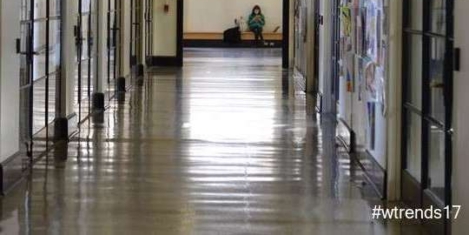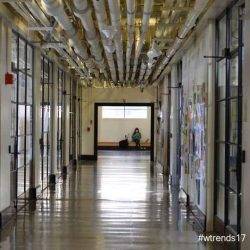October 26, 2017
Workplace design continues to lag behind the needs of modern working life
 Companies around the world waste potentially billions of dollars on under-utilised office spaces that are unfit for purpose and do not reflect the needs of modern workers, a recent benchmark study of over 100 workplaces claims. The study, Optimaze Workplace Review, from Finland based workplace analyst Rapal Oy took place during 2016, aggregates space utilisation data collected from 15 countries. The 330 observational space utilisation studies involved more than 6,600 walk-throughs of 111 buildings and 53,600 work spaces around the world to explore the working practices and environments of more than 23,000 people. It also includes a dataset of around 354 million observations of workstation use in total. The report’s main conclusion is that leadership teams are increasingly placing workplace management issues higher on their agendas, aware of the need to align spaces with new working cultures.
Companies around the world waste potentially billions of dollars on under-utilised office spaces that are unfit for purpose and do not reflect the needs of modern workers, a recent benchmark study of over 100 workplaces claims. The study, Optimaze Workplace Review, from Finland based workplace analyst Rapal Oy took place during 2016, aggregates space utilisation data collected from 15 countries. The 330 observational space utilisation studies involved more than 6,600 walk-throughs of 111 buildings and 53,600 work spaces around the world to explore the working practices and environments of more than 23,000 people. It also includes a dataset of around 354 million observations of workstation use in total. The report’s main conclusion is that leadership teams are increasingly placing workplace management issues higher on their agendas, aware of the need to align spaces with new working cultures.














 Those working within the built environment are already in the change business, was the view of Neil Usher of
Those working within the built environment are already in the change business, was the view of Neil Usher of 




 An overwhelming majority of employees are deliberately seeking out information they are not permitted to access, exposing a major cybersecurity problem among today’s workforce, claims new research published by One Identity. The survey, conducted by Dimensional Research, polled more than 900 IT security professionals on trends and challenges related to managing employee access to corporate data. Among key findings, a remarkable 92 percent of respondents report that employees at their organisations try to access information that is not necessary for their day-to-day work – with nearly one in four (23 percent) admitting this behaviour happens frequently. Most alarmingly, the report indicates that IT security professionals themselves are among the worst offenders of corporate data snooping. One in three respondents admit to having accessed sensitive information that is not necessary for their day-to-day work.
An overwhelming majority of employees are deliberately seeking out information they are not permitted to access, exposing a major cybersecurity problem among today’s workforce, claims new research published by One Identity. The survey, conducted by Dimensional Research, polled more than 900 IT security professionals on trends and challenges related to managing employee access to corporate data. Among key findings, a remarkable 92 percent of respondents report that employees at their organisations try to access information that is not necessary for their day-to-day work – with nearly one in four (23 percent) admitting this behaviour happens frequently. Most alarmingly, the report indicates that IT security professionals themselves are among the worst offenders of corporate data snooping. One in three respondents admit to having accessed sensitive information that is not necessary for their day-to-day work.













October 20, 2017
Seven workplace stories we think you should read this week (apart from ours)
by Mark Eltringham • Comment, Facilities management, Technology, Workplace design
Automation and Artificial Intelligence bullshit
Science in the gig economy
The seven deadly sins of AI predictions
The flight of people back to the suburbs
The changing psychology of the workplace
The rock and roll workplace